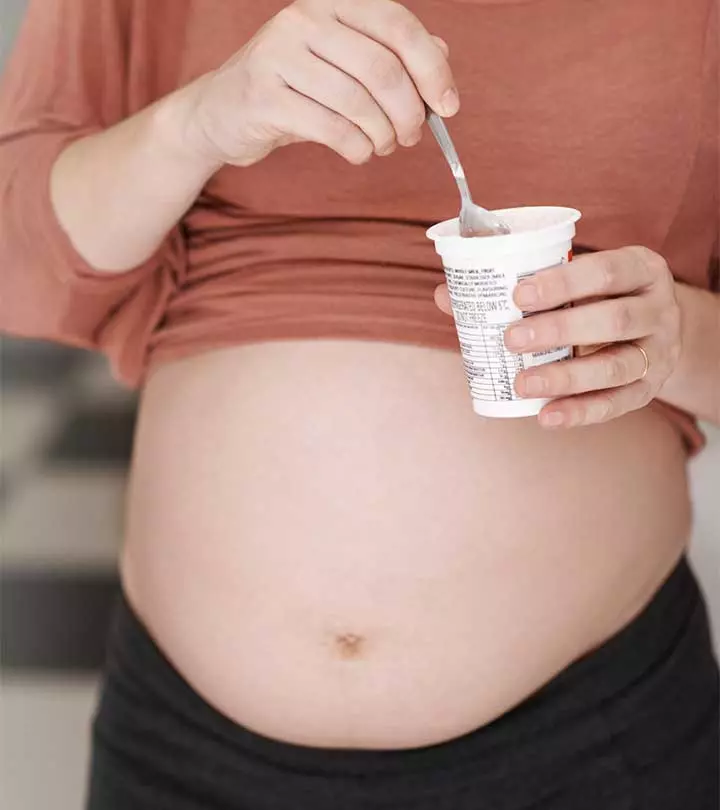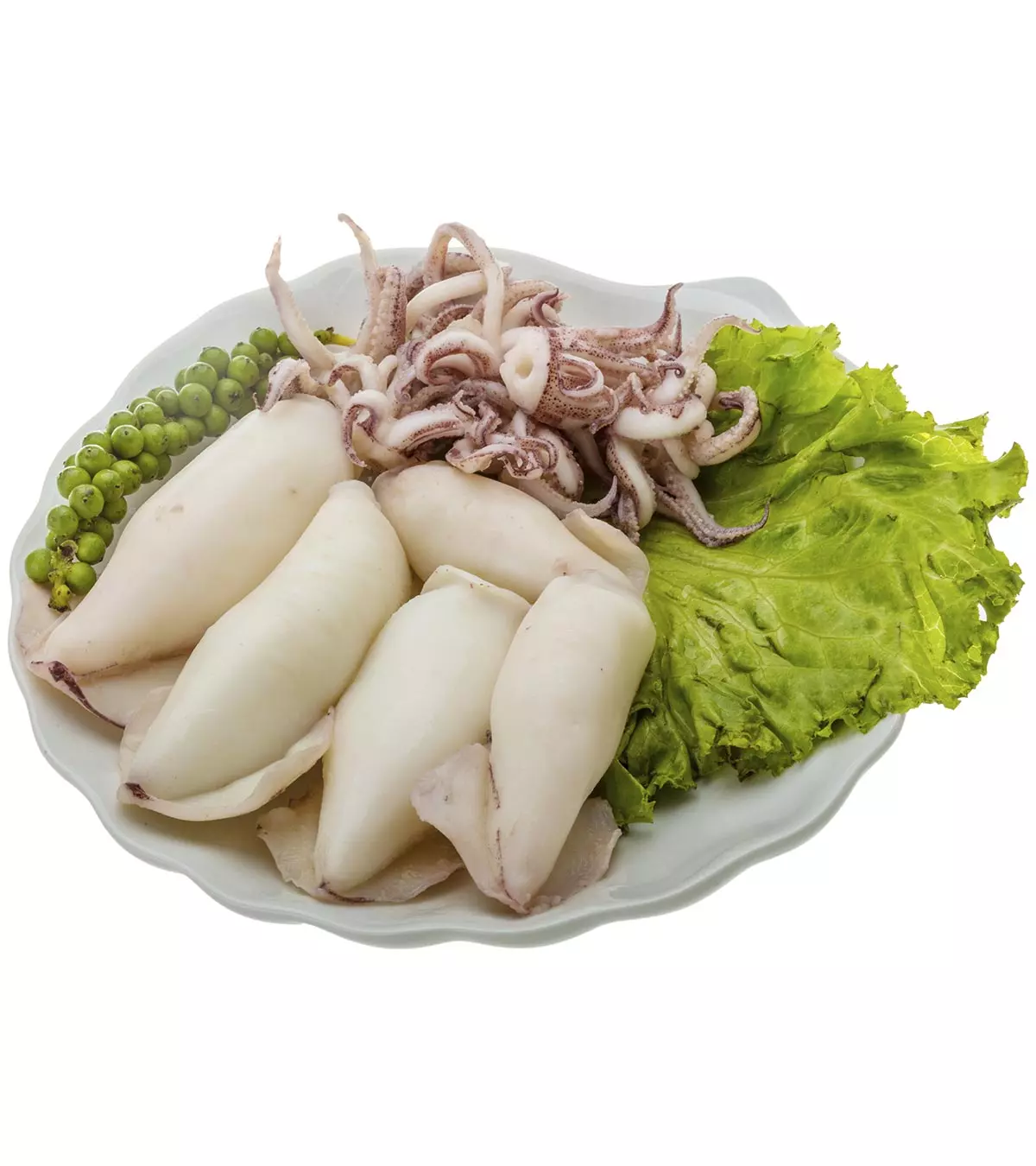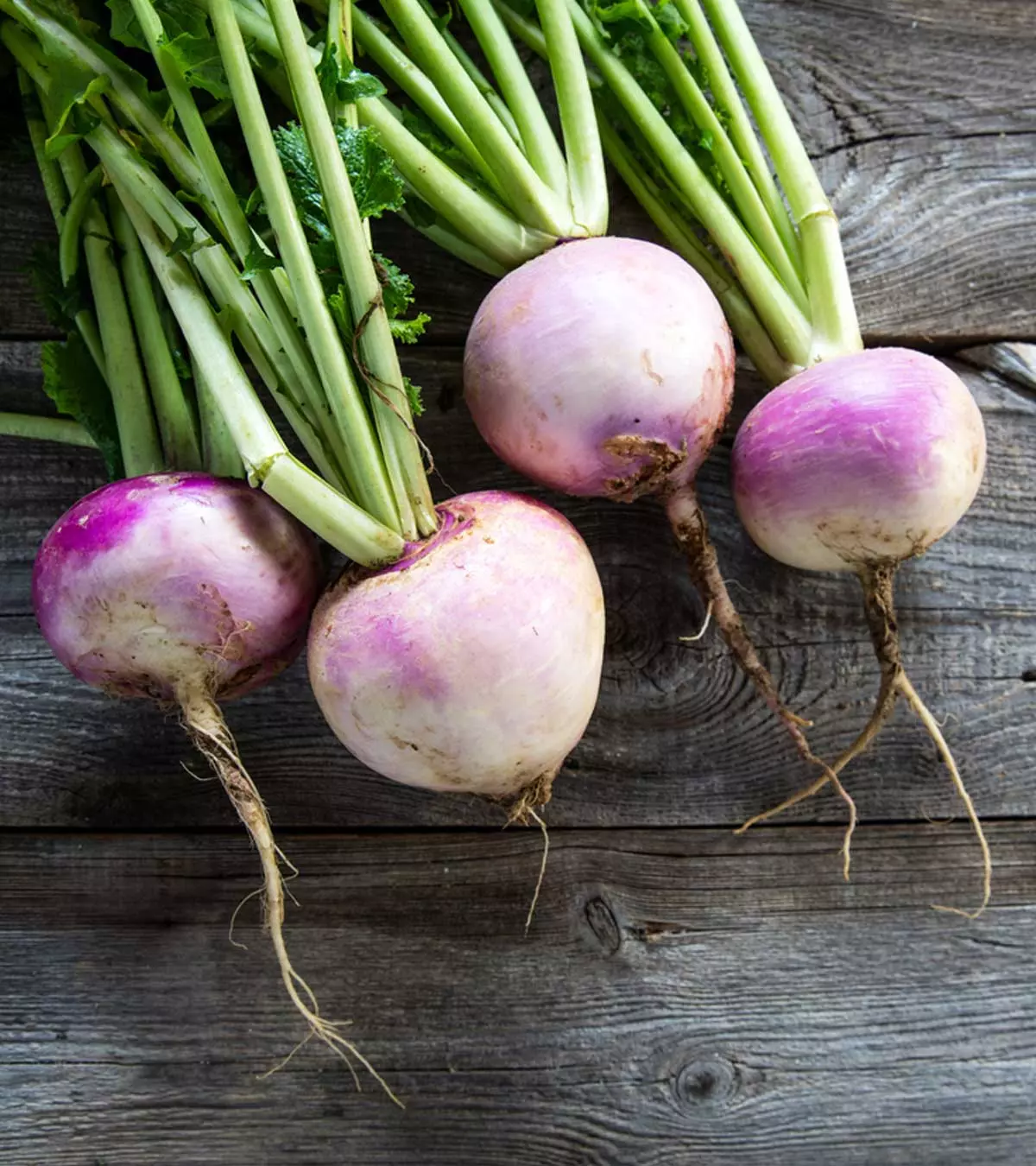
Image: Shutterstock
Oranges are a delicious fruit and are a great source of vitamin C. It is a beloved fruit of many, whether taken as tangy juice or fresh slices. However, you must be cautious about everything you consume when pregnant, and you may be confused about eating oranges during pregnancy. Read this post to learn about how safe it is to eat oranges when pregnant, their health advantages, how to incorporate oranges into your pregnancy diet, and any potential side effects.

Key Pointers
- Oranges are safe to consume in pregnancy when eaten in moderation.
- Oranges help expectant mothers by strengthening their immune systems, lowering blood pressure, and preventing constipation.
- Oranges are rich in folate, which enhances the development of the fetal brain.
- Oranges can be included in a pregnancy diet by consuming them as juice, popsicles, or salads.
- Excessive consumption of oranges can lead to stomach cramps, diarrhea, and a sore throat.
Is It Safe To Eat Oranges During Pregnancy?
Oranges are safe to eat during pregnancy, but you should have them in moderation. They provide plenty of nutrients and are a rich source of vitamin C, folic acid, calcium, potassium, and more. In order to reap the benefits of calcium-rich foods like oranges, consume them every day.
When eaten in excess they have some uncomfortable side effects. The high fiber content in oranges affects digestion directly. When eaten too much, this might lead to abdominal cramps and diarrhea.
 Did you know?
Did you know?Health Benefits Of Oranges During Pregnancy
, MS, a New York-based registered dietitian, says, “Satisfying that orange craving is one way to reap benefits for both mom and baby. The calories aren’t excessive, but they pack in a punch of micronutrients, including calcium, potassium, and vitamin C, which a mom needs during pregnancy.
“It’s this vitamin C that supports the baby’s immune system and collageniA fibrous protein present in cartilage and other connective tissue that regulates skin elasticity. production, and also aids iron absorption from all the healthy non-heme iron sources mom is enjoying, for example, beans and spinach.”
Here is a quick look at the nutritional benefits that you and your unborn child will get from oranges:
1. Improves immune system functions

Vitamin C boosts the immune system, and pregnant women require healthy immunity as they may be prone to many allergic and food-borne illnesses. Consuming oranges will not only strengthen your immunity but also keep your baby healthy (1). The healing properties of oranges come from their phytonutrientiA substance found in plants that help prevent several diseases. compounds like anthocyaninsiWater-soluble colored pigments of the phenolic group, present in fruits and vegetables. , citrus flavanones, a variety of polyphenols and hydroxycinnamic acids.
Vitamin C also helps absorb certain nutrients such as iron, which, in turn, helps form the baby’s cartilage, blood vessels, bones, and tissues. Hence, incorporating oranges into your diet as part of a healthy eating regimen may be beneficial in preventing nutrient deficiencies, alongside taking your prenatal vitamins.
2. Aids brain development
The need for folate increases by five to ten times during pregnancy and oranges can fulfill the requirement. Folate aids the development of the fetal brain and prevents neural tube defects in babies. Folate also helps develop new blood cells and tissues and improves the baby’s birth weight (2).
Also, DHA supplementation of orange juice at either 50 or 100 mg daily for 6 weeks is shown to increase plasma phospholipid DHA contents in children.
3. Prevents constipation
The rich fiber content helps in easy bowel movements and prevents constipation which is a common problem during pregnancy (3). The fiber in oranges not only help in good digestion but also regulates blood pressure, cholesterol, blood sugar, and prevents atherosclerosisiThe accumulation of cholesterol, lipids, and other chemicals in and on the arterial walls. .
4. Controls blood pressure
According to the CDC Morbidity and Mortality Weekly Report (MMWR), the incidence of pregnancy-associated hypertension surged from 10.8% in 2017 to 13.0% in 2019, indicating an upward trend. Consuming oranges can help mitigate this risk since the high potassium index of oranges prevents hypertensioni in pregnant women by controlling blood pressure (4).
5. Promotes hydration
Oranges contribute greatly to the daily fluid intake, thus providing sodium and potassium to maintain the fluid levels in the body (5).
6. Treats kidney stones

Oranges increase the pH value of urine, thereby increasing the citric acid excretion from the body. The fruit, therefore, helps in the prevention of kidney stones (6).
7. Supports respiratory system
The high carotenoid content in oranges helps in maintaining respiratory health during both normal and pregnancy phases (7).
8. Keeps the skin healthy
Vitamin C in oranges offers two beauty benefits. The antioxidative effect keeps the skin moist and taut, and also helps you deal with acne, which is a common problem during pregnancy (8).
 Health fact
Health fact9. Reduces leg cramps
A reduction in nutrients or factors such as dehydration may cause leg cramps. Consuming oranges or orange juice replenishes essential nutrients like potassium and rehydrates the body, which may help manage leg cramps (9).
10. Reduces nausea
The citrus content and scent of the orange may help relieve nausea in pregnant women. Therefore, you may try consuming orange juice or chilled orange pieces when nauseous. You can also smell an orange peel or incorporate orange zest into cold foods such as yogurt or ice cream (10) (11) (12) (13).
11. Enhances heart health
Orange contains soluble fiber known to aid in absorbing LDL cholesterol into the bloodstream. In addition, studies propose that the citrus flavonoids in oranges can help improve glucose tolerance, protect against oxidative stress, modulate lipid metabolism, and suppress inflammations. These radical scavenging, antioxidant, and anti-inflammatory properties may thus be an efficient therapeutic in treating cardiovascular diseases in the long run (14) (15).
Are Orange Peels Good For You?

Orange peels contain double the amount of vitamin C than the fruit does. They are a rich source of antioxidants like beta-carotene and have anti-inflammatory properties, and so, are good for maternal health. Therefore, they are perfect for consumption during pregnancy. Simply grate the peel and add to yogurt, porridge, or salads.
But you need to wash the orange thoroughly before using the peel. You could also wash them in warm water. However, note that the peels of fruits and vegetables are laden with pesticides and harmful microbes. Also, you need to eat the fruit in moderation.
How Many Oranges Can You Eat In A Day?
The US National Institute of Health recommends a daily dosage of 85 milligrams of vitamin C, which can be obtained from two oranges.
But you need to consider the quantity of vitamin C present in the other fruits and foods that you may consume in the day. Therefore, make sure that your overall intake of vitamin C meets the recommended daily dosage, as oranges are acidic in nature; and excess consumption could lead to acidity issues.
What Is The Best Time To Eat Oranges?
Oranges or any other citrus fruits can be eaten at any time of the day, even on an empty stomach. You can eat them two to four times a day by including the fruit in your maternal diet in various ways.
How To Include An Orange In Your Diet?
Here are a few suggestions:
- Add some sliced oranges to a salad for extra taste
- Mix with other fruits for a rich fruit bowl
- Peel and blend the fruit with some water and sugar for fresh orange juice
- Top orange slices with brown sugar and microwave them to broil.
- Make orange juice cups or popsicles by putting them in molds and freezing them

 Quick tip
Quick tipOranges are indeed nutrient-packed fruits, and are very easy to eat. But, they could come with a bunch of side-effects.
Side Effects Of Oranges In Pregnancy
Although the benefits of eating oranges are multifold. During pregnancy, you must be aware of the unwanted effects of their excessive consumption.
- The high citric acid content can lead to a sore throat and is also bad for the enamel (16).
- It can increase the fiber content in the body, which may have a negative effect on digestion, leading to loose motions and abdominal cramps.
- It can increase your calorie intake and sugar levels, thus putting you at risk of gestational diabetes if you eat them excessively.
- Being high in acidity, they can cause heartburniA burning pain in the chest when stomach acid holds up into the tube that transports food from mouth to stomach. . If you suffer from gastroesophageal reflux disease (GERD), it may aggravate the condition.

- Excess vitamin C can lead to preterm labor (17).
With all that information, you might have a few questions to ask. In the next section, we have covered a few commonly asked questions.
Frequently Asked Questions
1. Is orange juice a healthy option during pregnancy?
Yes, pasteurizediA method of food preservation by heating moderately to kill microorganisms. orange juice without any additivesiA chemical used in small amounts to enhance or extend the shelf life of foods. is one of the many healthy juices to drink during pregnancy. You can have up to two glasses of orange juice a day one to two hours after a meal. It is rich in calcium and helps in having healthy bones.
Fortified orange juice is also a good option in case you are experiencing morning sickness or are lactose intolerant. However, you should consult your healthcare provider before using it (18). Shamayeva recommends, “Skip freshly squeezed options like those you’d get at a fresh juice bar or make at home. They may have listeria and other potential microorganisms.”
2. What happens if you eat orange seeds during pregnancy?
Orange seeds will not cause any problem, but in rare cases, large seeds might choke you. Therefore, go for navel oranges as they are seedless and easy to peel.
3. Are halos safe to eat?
Halos are California-grown mandarins. They are grown in rich, fertile soil, and are sweet and delicious. They are safe to eat unless you consume more than four a day.
4. Are cuties good for you?
Cuties are another type of California-grown mandarins that are seedless. They are bright, sweet, and have superior flavor. They are good to eat in moderation, and are rich in vitamins, minerals, fiber, and antioxidants.
5. What do orange cravings mean during pregnancy?
Shamayeva opines, “An orange craving doesn’t prove, one way or another, that something is wrong, your vitamin levels are imbalanced, you’re having a girl, or anything else you might have heard. However, check in with your healthcare team if you’re concerned or if the craving is paired with symptoms you’re not sure about.”
6. Is orange anti-inflammatory?
Yes, oranges have been found to possess anti-inflammatory properties. However, more research needs to be conducted to ascertain long-term effects (19).
7. Can too much orange juice harm an unborn baby?
Too much orange juice may increase your total sugar intake. A single serving (6 ounces) of fruit juice (100%) contains about 15 to 30 grams of sugar which means 60 to 120 calories. The high sugar and low fiber in juice may result in spikes in blood sugar and increased appetite resulting in weight gain. This is especially concerning if you already have gestational diabetes. Excessive weight gain and uncontrolled diabetes may be harmful to the unborn baby (20) (21) (22).
Consuming oranges as a part of your prenatal nutrition plan can impart various health benefits such as the baby’s brain development, increased immunity, and improved digestion. But anything taken in excess can be harmful. Therefore you need to consume only the recommended number of oranges during pregnancy to avoid any adverse reactions. Two oranges a day could provide you with all the nutrients and benefits you require, but consult your OB/GYN to check its safety and follow the necessary precautionary tips for a healthy and safe pregnancy.
Infographic: Health Benefits Of Oranges During Pregnancy
Oranges are a common winter-favorite fruit and a rich source of vitamin C, so they benefit pregnant women. In the following infographic, we have highlighted a few benefits of consuming oranges during pregnancy. If you like it, save and share it with people who will benefit from the information.
Some thing wrong with infographic shortcode. please verify shortcode syntax
Illustration: Is It Safe To Eat Oranges During Pregnancy?

Image: Stable Diffusion/MomJunction Design Team
References
- Orange.
https://hcnp.hawaii.gov/wp-content/uploads/2017/01/Orange.pdf - Folic acid for a healthy baby.
https://www.urmc.rochester.edu/encyclopedia/content?contenttypeid=134&contentid=2 - Eating, diet and nutrition for constipation.
https://www.niddk.nih.gov/health-information/digestive-diseases/constipation/eating-diet-nutrition - Potassium.
https://www.urmc.rochester.edu/encyclopedia/content?contenttypeid=19&contentid=potassium - Healthy hydration combines fluids and water-packed foods.
http://www.nutritionatc.hawaii.edu/HO/2015/579.htm - Kidney stones-self care.
https://medlineplus.gov/ency/patientinstructions/000135.htm - Andrew L Thorne-Lyman and Wafaie W Fawzi; (2012); Vitamin A and carotenoids during pregnancy and maternal, neonatal and infant health outcomes: a systematic review and meta-analysis.
https://dash.harvard.edu/bitstream/handle/1/26864784/nihms519234.pdf?sequence=1 - Jae-Hee Park et al.; (2014); Antioxidant activity of orange flesh and peel extracted with various solvents.
https://www.ncbi.nlm.nih.gov/pmc/articles/PMC4287321/ - Muscle cramps.
https://www.mountsinai.org/health-library/symptoms/muscle-cramps - Morning sickness: 10 foods that fight nausea during pregnancy.
https://www.themotherbabycenter.org/blog/2025/08/foods-that-fight-nausea-during-pregnancy/ - Nausea and Vomiting During Pregnancy.
https://www.nm.org/-/media/northwestern/resources/patients-and-visitors/patient-education/pregnancy-and-newborn-care/northwestern-medicine-nausea-and-vomiting-after-pregnancy.pdf - The pregnancy food guide.
https://www.brighamandwomens.org/assets/BWH/obgyn/pdfs/nob-bwh-pregnancy-food-guide.pdf - Nausea and Vomiting During Pregnancy.
https://hospitals.aku.edu/pakistan/patients-families/Documents/Nausea%20and%20Vomiting%20During%20Pregnancy.pdf - Getting the Most Out of Your Glass of Orange Juice.
https://stvincents.org/about-us/news-press/news-detail?articleId=48370&publicid=745 - Ayman M. Mahmoud et al; (2019); Beneficial Effects of Citrus Flavonoids on Cardiovascular and Metabolic Health.
https://www.ncbi.nlm.nih.gov/pmc/articles/PMC6431442/ - Are oranges good for your teeth?
https://sites.psu.edu/siowfa14/2014/10/16/are-oranges-good-for-your-teeth/ - Anna Maria Siega-Riz et al.; (2003); Vitamin C intake and the risk of preterm delivery.
https://pubmed.ncbi.nlm.nih.gov/14520228/ - Survival of Listeria monocytogenes in fruit juices during refrigerated and temperature-abusive storage.
https://vtechworks.lib.vt.edu/items/6967e7fe-4a48-4572-a715-4138ae14dffc - Kelly Copeland Cara et al.; (2025); Effects of 100% Orange Juice on Markers of Inflammation and Oxidation in Healthy and At-Risk Adult Populations: A Scoping Review, Systematic Review, and Meta-analysis.
https://www.ncbi.nlm.nih.gov/pmc/articles/PMC8803484/ - Gestational Diabetes Diet.
https://medlineplus.gov/ency/article/007430.htm - Fruit vs. Fruit Juice: What’s the Difference?
https://www.stanfordchildrens.org/en/topic/default?id=fruit-vs-fruit-juice-whats-the-difference-197-30060 - Pregnancy and birth: Weight gain in pregnancy.
https://www.ncbi.nlm.nih.gov/books/NBK279575/ - Are Oranges Good for You — or the Planet?
https://foodrevolution.org/blog/are-oranges-good-for-you/ - Y Miyake, et al.; (2010); Consumption of vegetables, fruit, and antioxidants during pregnancy and wheeze and eczema in infants
https://pubmed.ncbi.nlm.nih.gov/20102358/
Community Experiences
Join the conversation and become a part of our nurturing community! Share your stories, experiences, and insights to connect with fellow parents.
Read full bio of Dr. Shikha Sharma
- Leyla Shayeva is the VP of Content at M3 USA, New York City. She is a registered dietitian with around a decade of experience in content and nutrition. She did her BA in Spanish Linguistics with minors in chemistry and nutrition from New York University and Nutrition and MS in Clinical Nutrition from the same university.
 Leyla Shayeva is the VP of Content at M3 USA, New York City. She is a registered dietitian with around a decade of experience in content and nutrition. She did her BA in Spanish Linguistics with minors in chemistry and nutrition from New York University and Nutrition and MS in Clinical Nutrition from the same university.
Leyla Shayeva is the VP of Content at M3 USA, New York City. She is a registered dietitian with around a decade of experience in content and nutrition. She did her BA in Spanish Linguistics with minors in chemistry and nutrition from New York University and Nutrition and MS in Clinical Nutrition from the same university.
Read full bio of Rebecca Malachi
Read full bio of Swati Patwal
Read full bio of Dr. Joyani Das

















